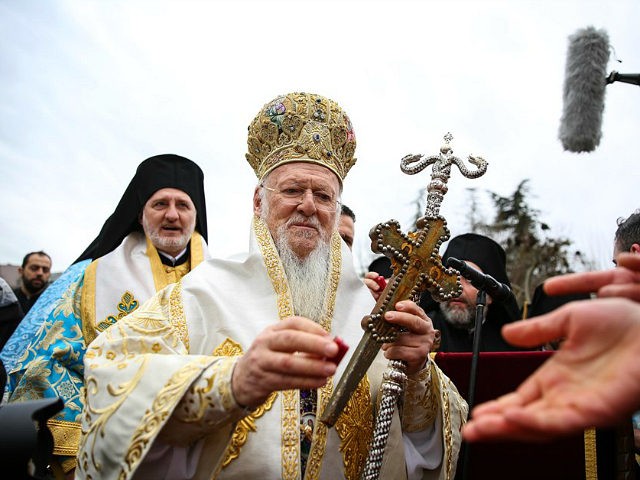Three days after Turkish President Recep Tayyip Erdogan recited an Islamic prayer to honor the Ottoman conqueror of Istanbul, Russian President Vladimir Putin extended a greeting to the Greek Orthodox Patriarch Bartholomew I.
The Russian government made sure to refer to Bartholomew by his official title, “Patriarch of Constantinople,” using the Christian name for the city. Putin called to relay well wishes from the Russian Orthodox Patriarch, Kirill, and thank him for his work in attempting to unite the Orthodox churches. Bartholomew I, as Patriarch of Constantinople, lives in Istanbul and presides over the Church of St. George in Fener, a district of the city.
The call came during Putin’s current visit to Ankara on Tuesday to discuss domestic relations with Erdogan as well as their growing united front in Syria, nominally against the Islamic State but also affecting the anti-ISIS Kurdish forces in the country. While Putin is one of the most powerful patrons supporting Syrian dictator Bashar al-Assad, and Erdogan has repeatedly called Assad a “terrorist,” the two have come to a cooperative understanding on their involvement in Syria.
According to the official Kremlin dispatch, “the Patriarch of Constantinople congratulated Vladimir Putin on his victory in the presidential election and wished him a happy Easter.” Putin recently “won” a presidential election marred by the arrests of prominent opposition leaders and widespread allegations of voter intimidation and fraud.
Putin, in turn, sent him “best wishes” from Patriarch Kirill and “All Russia and expressed special gratitude for his constant efforts to support unity of the Orthodox world.”
The Russian government also reported that Putin thanked Bartholomew for defending the right of “the Russian-speaking community in Turkey” to practice Christianity openly.
Putin’s support for the Patriarch of Constantinople follows years of tensions between the patriarchs of that city and Moscow but comes at a time when Erdogan has increasingly marginalized Christianity and imposed Islamic education in schools. This weekend – on Holy Saturday, the day before Easter for Catholic and Protestant Christians – Erdogan used the Hagia Sophia, built by Greek Christians, to recite an Islamic prayer.
Erdogan, speaking at the launch of an event billed as a classical Turkish art forum, recited the opening of the Quran in honor of “Istanbul’s conquerer,” Ottoman Sultan Mehmed the Conqueror, at the former basilica. Constantinople became Istanbul in the 15th century after the Turkish conquest and the Hagia Sophia was converted into a mosque. During the founding of the Republic of Turkey in the 1920s, however, founder Mustafa Kemal Atatürk ordered the Hagia Sophia become a secular museum in his drive to expel Islamic influences from political power in the country.
Since taking over the country, Erdogan has been slowly etching away at the secular safeguards around the building. In June 2016, Erdogan allowed the first Ramadan prayers to be held in the basilica in the modern era. A month later, he permitted a Muslim call to prayer there. In March, Erdogan led an Islamic prayer at the basilica during the Catholic Holy Week, the holiest Christian holiday (Orthodox Christians will celebrate Easter on April 8).
The Greek Orthodox patriarch has largely attempted to avoid conflict with Erdogan. In January, Patriarch Bartholomew expressed public support for Erdogan’s “Operation Olive Branch,” the invasion of northern Syria’s Afrin region, home to a large Kurdish and Christian population. “As the tradition of our church, we are always praying for our state, the health of our leaders, and the welfare and happiness of our people,” he said in a statement. “We have not forgotten about the hundreds of thousands of people who have been displaced because of conflicts in our neighbors in the south, especially in Syria.”
Erdogan’s Islamist policies may have nonetheless made a conciliatory call to Patriarch Bartholomew more important than addressing the rifts among the Orthodox Christian leaders. Patriarch Bartholomew has faced some resistance from Patriarch Kirill in maintaining his title of “first among equals” as Orthodox patriarch. In 2016, the Greek Orthodox leader called a Great and Holy Council to address differences among the Orthodox churches. Patriarch Kirill boycotted the event as Russians demanded that the Patriarch of Moscow take the title of first among equals.
A year later, Patriarch Kirill convened orthodox leaders in Moscow; Patriarch Bartholomew did not attend.
Putin, Erdogan, and Iranian President Hassan Rouhani are meeting Wednesday to discuss strategy and mutual interests in Syria. While all three claim their objective in the country is to eradicate the Islamic State, Putin appears intent on replacing the U.S. military with the Russian army; Erdogan on eradicating the Kurdish population on his border; and Rouhani on entrenching Iranian proxies like Hezbollah in Syrian politics for the long term.

COMMENTS
Please let us know if you're having issues with commenting.